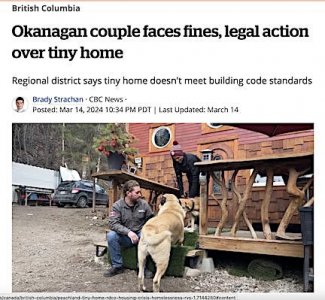JBR
Well-known Member
Here's an issue that's been surfacing in western Canada. I suspect that some districts of the U.S. may have something similar going on. I don't know at all about other countries (UK, Australia & elsewhere).
A young couple put their time, energy, money & skill into building a shelter they could afford. They made every attempt to be conscientious. Authorities are coming down on them with development & building restrictions. Are people with minimal savings and limited income supposed to wind up in a tent city? The despair that goes with that option often seems enough to drive people to drug addiction.

https://www.cbc.ca/news/canada/brit...dco-housing-crisis-homelessness-rvs-1.7144280
A young couple put their time, energy, money & skill into building a shelter they could afford. They made every attempt to be conscientious. Authorities are coming down on them with development & building restrictions. Are people with minimal savings and limited income supposed to wind up in a tent city? The despair that goes with that option often seems enough to drive people to drug addiction.

https://www.cbc.ca/news/canada/brit...dco-housing-crisis-homelessness-rvs-1.7144280

